Ryan Sheely:
So here’s a topic that springs out of the ongoing ‘Merica Madness tournament. American Psycho just made a deep run in the bracket, getting knocked off in the Capitalism finals by Jay-Z’s American Gangster.
I think there is potentially still a lot more to say about the novel, as well as about the Christian Bale-starring film adaptation (which was eliminated by the novel in a play-in round).
I guess here’s a question to start with: do you guys actually like American Psycho (either version)? I had never seen the film before sitting down to work on the tournament, and I actually didn’t care for it a lot. I had already seen the famous scenes a bunch as memes (the business cards, the Huey Lewis speech, the sex scene where he points at himself in the mirror, the scene where he drops the chainsaw on the woman down the stairwell). While all of those scenes are iconic, I found the movie as a whole to be very slow and meandering.
I think the book avoids this because of the overwhelming presence of Bateman’s voice throughout, which makes a lot of the themes shine through more clearly. But the book is unpleasant to engage with in other ways- namely the endless lists of clothing designers and the very detailed and grisly depictions of the violence. In the end, I do think it hangs together and is a really interesting and thought provoking read, but I was also really glad to put it down when I finished.
Matt Belinkie:
I really like both the movie and the book, in different ways. The movie is legitimately funny. The business card scene. The monologues about pop music (my favorite is Whitney Houston). Bale’s perfect delivery of “I have to return some videotapes.” And the violence is fun too! I love the moment where he goes through a lobby, enters a revolving door, goes a full rotation to pop out and shoot the security guard, and then runs outside without missing a beat.
The book really shocked me with how disturbingly graphic the violence is, and made me question my enjoyment of the movie and even whether the movie should have been made in the first place. In the book, Bateman is disturbing. I recall one scene in particular where he’s staying in a beach house. He finds a dead jellyfish on the beach, brings it into the house, microwaves it, and eats some of it. Why? Because he’s truly psychotic. That level of unhinged just doesn’t come across in the movie, which makes Bateman seem more relatable, less alien.
So the book is way more disturbing, but I also thought it could be very funny. There’s a whole chapter where Bateman and his friends are negotiating what restaurant to go to, for hours. There’s another chapter where they sit in the back of a limo discussing various kinds of bottled water. Maybe my favorite scene is where Bateman attends a U2 concert and stands right next to the stage, trying to discuss where they are going to go for dinner afterwards.
Sheely:
The other thing I liked about the U2 scene is that he has this hallucination where Bono speaks to him and him only. Isn’t Bono demonic or something? I found this funny when juxtaposed with Bateman’s insistence that he doesn’t like live music.
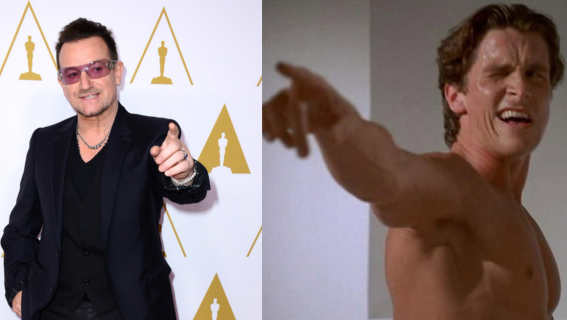
Is it weird that I couldn’t find a picture of Christian Bale and Bono hanging out together? I feel like they should be friends for some reason.
Belinkie:
When we were setting up the ‘Merica bracket, Psycho was in the Violence region until the last minute. I was actually reading it in preparation, and the more I read the more I thought it was more about consumer culture than violence. I still think that’s right – the violence is a symptom.
Sheely:
Yes, I think so too. I actually think that the movie alone could have stayed in Violence, though. While it does somewhat express the idea that the violence is a symptom of the dehumanizing elements of consumer capitalism, it is more of this ballet of gore, especially once the killings pick up.
The book pays much more attention to Bateman’s internal life. Although he doesn’t know how to regulate his emotions at all, he is VERY aware of his stress and anger levels, and expresses his often disoriented or distraught emotional state (often in social situations involving competition or status)
Richard Rosenbaum:
I think there’s an important distinction to be made between “dehumanization” and “deindividualization.” In both versions of AP, it seems to me that the argument is that what consumerist capitalism is portrayed as doing isn’t so much eliminating humanity but eliminating the distinctions between one human and another. Just like one dollar bill is the same as any other, in Bateman’s world one human is essentially identical to the next. This is why the minutest details of business card typefaces or shampoos are so important: these are the barely discernible differences between one person and another that are permitted by the system. These are important to Bateman because he wants to believe he is an exception, and his breakdown at the end comes when he starts to realize that nobody in the world knows the difference between him and anyone else, to the point where he will get away with all these murders not because he’s smarter than everybody else but because most of the victims might as well be anyone else AND Bateman himself has a false alibi solely because he has been mistaken for one of his (practically identical) colleagues.
Belinkie:
Of course, there’s some doubt about whether the murders actually happen or whether they’re just fantasies. Certainly it seems implausible that he could kill people on the street the way he does and just walk away from it. There are also moments that seem to be pretty clearly in his head, like when he bites into a chocolate bar and finds a bone. There are also moments that almost feel like magical realism, like when his friend Price runs into a mysterious tunnel and disappears, only to surface months later with a mysterious smudge on his forehead.
Personally, I don’t think there’s much point in trying to figure out what’s “true” and what’s not – there’s some ambiguity, but what’s important is Bateman’s perceptions of reality. Even if he doesn’t kill anyone, he’s still a pretty sick guy (to quote him).
Jordan Stokes:
Eliminating the distinction between one human and another? How dare you! MY business cards are high-gloss eggshell vellum, Richard! High! Gloss! Vellum! WHAT ARE YOUR FUCKING BUSINESS CARDS MADE OUT OF, RICHARD?!??
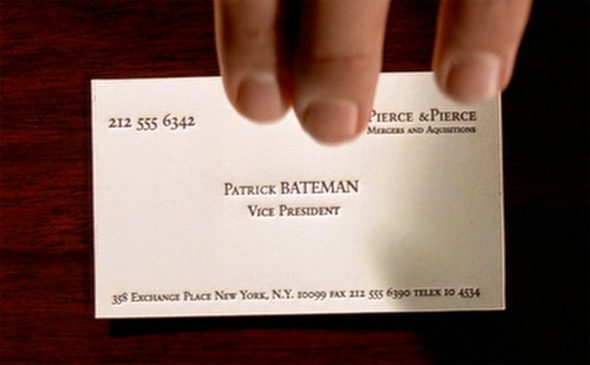
Actually, the color was “bone.” And vellum is a ludicrously inappropriate material for a business card, Stokes, get your act together.
Belinkie:
We’ve talked about how Bateman seems indistinguishable from anyone else in his social circle. But to most of us, Bateman’s life would seem remarkable. He lives in the same building as Tom Cruise! He sits in the front row at U2 concerts! He goes to all the best restaurants. It’s only when you’re inside that 1% club does everyone’s life start to seem interchangeable. So is this depersonalizing unique to the rich? Does Easton Ellis have anything to tell us about the poor (the many homeless people Bateman ignores/kills) or the middle class (his secretary Jean)?
Is one of the messages of this book mo’ money, mo’ problems?
Sheely:
I wonder if it is more of an issue of mo’ class, mo’ problems. It seems like Bateman (and others in his milieu) are capable of distinguishing what class people belong to, but not between individuals within those classes.
Belinkie:
So we can imagine an American Psycho about Bateman’s secretary Jean and her friends, and it would be just as obsessed with brands. Just different brands. Could the book be about any American subculture? Brooklyn hipsters? Washington insiders? Small town Texas football boosters? Or does being rich amplify the conformity in a unique way?
Sheely:
That is an interesting thought experiment. I think so. I guess my read is colored by an interview with Easton Ellis from 2010 that gets cited a lot. Here’s the quote:
He (Bateman) did not come out of me sitting down and wanting to write a grand sweeping indictment of yuppie culture. It initiated because my own isolation and alienation at a point in my life. I was living like Patrick Bateman. I was slipping into a consumerist kind of void that was supposed to give me confidence and make me feel good about myself but just made me feel worse and worse and worse about myself. That is where the tension of “American Psycho” came from. It wasn’t that I was going to make up this serial killer on Wall Street.
But I guess that doesn’t totally answer Matt’s question. Because as much as American Psycho wasn’t necessarily just designed to be about the elite end of the 80s yuppie set, that was Easton Ellis’s millieu at the time, and that was driving the alienation that he was working through when writing the novel.
I do tend to think that those pathologies and patterns of thought could have been told from the perspective of another class or subculture, since the aim is a depiction of alienation. But the end product might read differently, given possibly different modes of alienation. That is, an American Psycho in a different economic or social grouping might have a different mix of consumerism, labor, and economic survival, and a different psychological manifestation of those stresses.
Stokes:
There’s a broader discourse of authenticity, though, where the richer you get, the faker you are. Think about The Texas Chainsaw Massacre, where the killers are laid-off slaughterhouse workers. There’s nothing consumerist about them — they don’t consume! I mean, okay, I technically the whole point of the movie is that they consume the people that they chainsaw-massacre. But they don’t buy anything. Everything that they own is an artisanal one-off made out of, like, human thighbones or whatever. And they’re united by deep familial bonds. (One of the creepiest things about that movie — in a quiet kind of way — is that the cannibals have warmer human relationships than their victims do.)
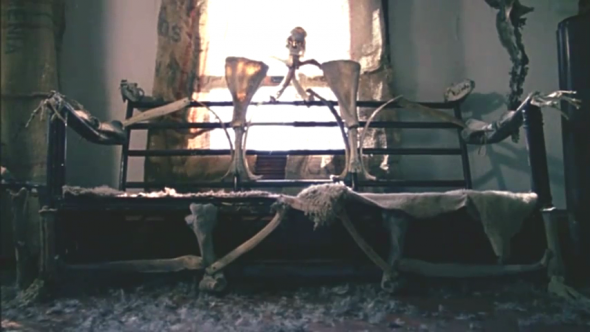
Not just handmade: sustainably sourced!
So whether Ellis wanted it that way or not, he’s tapping into the idea that the rich would cheerfully drink your blood for sport. Which is a thing that — as a culture, on some half-conscious level — we totally believe. Tobe Hooper is tapping into another idea, equally powerful, which is that the poor would cheerfully drink your blood out of tradition and necessity.
I cannot think of a middle class serial killer narrative. (Plenty of cases where the serial killer is middle class, none where class is an issue in the way that it is for these movies.) Maybe… maybe if you rope in things like The Stepfather, or Serial Mom, or even Hot Fuzz, maybe the middle class will cheerfully drink your blood in order to keep up appearances and fit in with their neighbors?
Note that Bateman is not okay with just fitting in. He wants to stand out. He needs to have THE BEST business card. I think that in real life, that impulse scales up and down with perfect uniformity. Like, there are kids that feel about getting a good table at McDonalds the way that Bateman feels about getting a table at Espace. But in our fictions, there’s much more of a sense that middle class people just want to blend.
Ben Adams:
Let me propose a some candidates for a middle class serial killer: 1) The Burbs. This one might actually be the exception that proves the rule. It’s been a while since I’ve seen it, but The Burbs is an interesting edge case. It’s definitely firmly located in the middle class milieu. But the serial killers are the “weirdo” family that moves in next door – not necessarily fellow suburbanites. So the message is possibly more about the fear of the Outsider entering the ‘burbs than it is about the ‘burbs themselves. OTOH, part of the gag of the movie is that the super nosey, keeping-up-with-the-joneses nature of suburban life gets the protagonists into trouble.
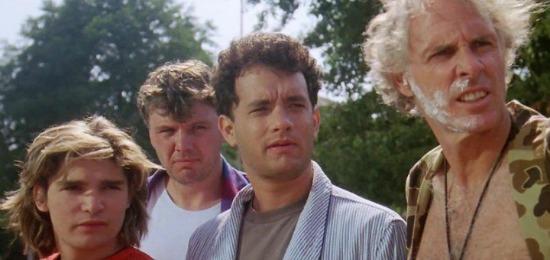
Just spitballing here: what if we snuck into the killer’s basement? That sort of thing usually ends well, right?
2) Dexter. There are actually two examples here. 2A) is Dexter himself – he’s an (adopted) middle class kid with a middle class job (technician) yet he’s a killer. But Dexter, we are led to believe, was just Born a killer. Indeed, his middle class father manages to use the middle-class work ethic to turn his seemingly inevitable evil-serial-killer son into a semi-upstanding member of society, who at least uses his evil desires for some (twisted) version of public good. So it’s not really a critique of middle class life.
2B) is Season 4’s John Lithgow/The Trinity Killer, who I think is a fairly prototypical middle-class serial killer. He’s got a seemingly perfect middle class life and family, yet he’s hopelessly twisted. If we’re putting this into a theme along the lines of Jordan’s blood drinkers, the underlying anxiety that the middle class killer taps into isn’t a reason for drinking your blood, like sport, tradition, or necessity. We don’t even care so much why the middle class drinks blood in the first place. The scary thing is that the blood drinkers are next door and you don’t even know it.
Stokes:
“We traced the call — it’s coming from INSIDE YOUR TAX BRACKET!”
John Perich:
Late to the discussion, as ever, but the perfect example of Middle Class Killers is the survivors who turn on each other in a zombie piece.
We know one of the core horrors of a zombie story is not what the zombies do, but what humans do to each other in the face of zombies. Zombies are a shambling middle-class anxiety: the cities are full of unreasoning hordes, let’s get to the country and hole up, what do we do if the power goes out, etc. That anxiety is played out via recriminations, ostracism, and, eventually, brutal internecine warfare.
Sheely:
Both of these sets of ideas about the horror of middle class killers circle back in an interesting way to American Psycho. There, part of the horror (both for Bateman and for the reader) is that no one seems to notice or care about his murders. Sure, the detective (played by Willem Dafoe in the movie) does question him, but ultimately provides Bateman with an alibi that’s based on witnesses mixing Bateman up with other Wall Street types. Similarly, Bateman’s lawyer refuses to believe his confession, because the lawyer insists that he had lunch with Paul Owen twice in London.
The only person who recognizes Bateman as a killer is a taxi driver who correctly identifies him for killing another taxi driver, and then robs him. (This is just in the book.) This is an interesting flip of Ben’s observation about the hidden blood drinkers next door, and John’s comment about zombie threats. In Bateman’s world, even horrific murders aren’t something that can get him recognized by people in his own class, leading to an intensification of the sense that he isn’t really there at all.
Belinkie:
The taxi driver scene, which is the second-to-last chapter in the book, is super interesting for a couple reasons. First of all, if it’s in doubt whether Bateman actually did any of the violent crimes or just imagined them, this scene seems to suggest he DID do them. (Unless him getting robbed by the taxi driver is itself a fantasy.) Secondly, I think it’s significant that Bateman is identified, held at gunpoint… but then robbed and released. The taxi driver’s outrage that Bateman killed his friend Solly almost instantly gives way to greed, and that greed lets Bateman escape. So we’re back to materialism. The taxi driver’s lust for sunglasses allows Bateman to walk free.
Stokes:
And that in turn speaks to the unique horrors of yuppiedom. We’ve had rich monsters forever — ask Dracula about that. But in Bateman’s world, if he drinks your blood, it’s because a whole roomful of people lined up to LET him drink your blood. And that’s where the point about consumer culture and the point about class begin to sort of bleed together.
Bateman is a Master of the Universe, and not the awesome He-Man kind. The whole world is full of people that are dedicating themselves to making his life easier, whether that means selling him a business card or whether it means setting him up with an alibi. The reason for this is not just that he’s rich. It’s that he spends.
A real miser — Ebenezer Scrooge, say — doesn’t have an entourage. He doesn’t have a personal trainer making him a wheatgrass smoothie after he gets off his ergonomically tailored CardioGlide at whatever the even-more-upscale-version of Equinox he works out at. Bateman can’t be the privileged class that he is without throwing his money around. By buying yuppiedom, he buys invulnerability: he can be a killer (or have constant fantasies of murder) without losing his freedom or his status.
But he also buys interchangeability. Because after all, he’s not THAT rich. Every rich-person place he goes is crowded with other rich people who paid just as much as he did to get there. And all that any of them have going for themselves is their ability to spend. That’s the only thing that got them in the door. So what if you’re a dedicated father and family man? So what if you write brilliant feminist slam poetry on the weekends? And so what if you murder children and stuff them into trash cans? Try using any of that to get a corner booth at Dorsia. You are what you buy. And since what you buy is, by definition, exchangeable… how does it go again, Patrick?
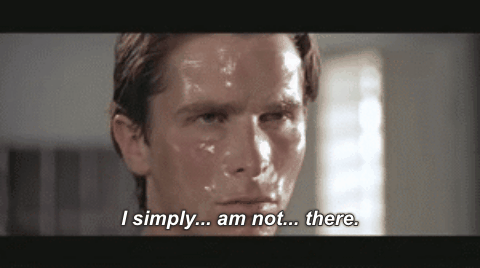
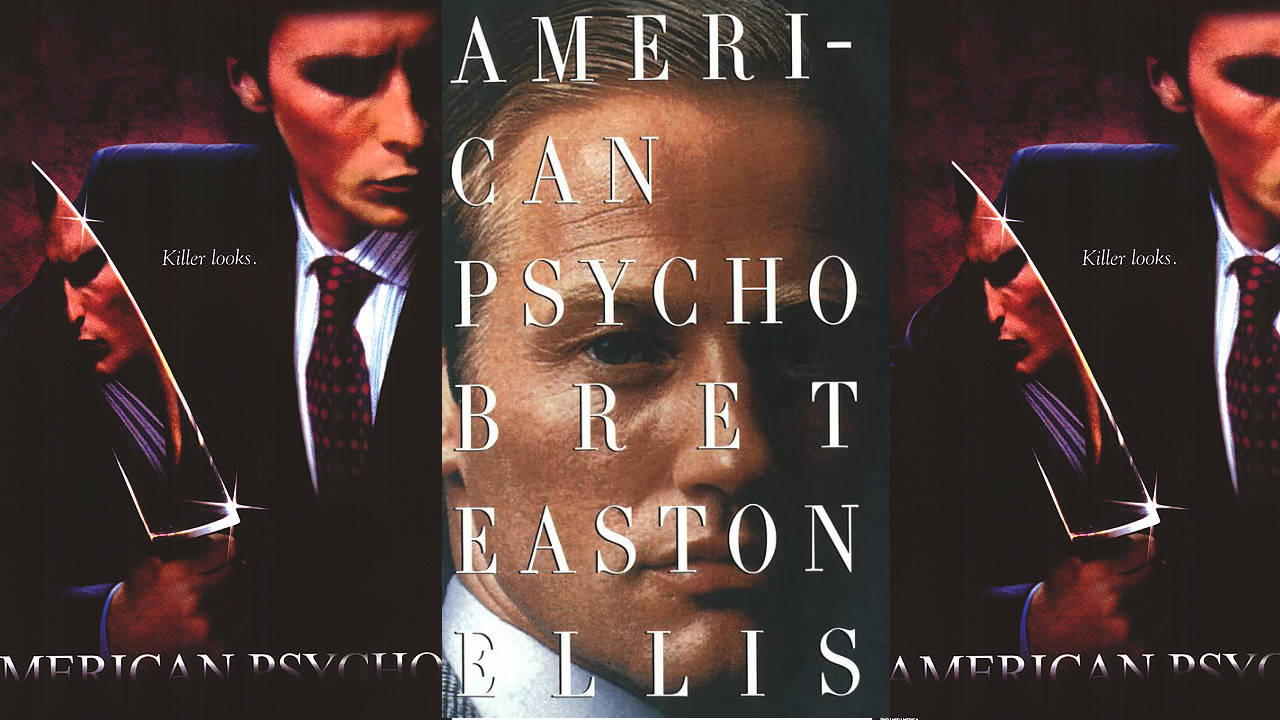
Stokes, your black humor is on point! Soooo much “eeeekkk” as I chuckle to myself. “Not just handmade: sustainably sourced”
Does Marx hold the answer in his use of “alienation.” That we are disconnected from each other and from our labor, and I would argue from this think tank, from the fruits of our labor.
Wealthy people are only valued culturally for what they can consume. Poor people are seen culturally as defined by their need to consume, or that there needs are so far from met they are only concerned with consuming.
Middle class people are interested in escaping the perception that consuming is all they are for and so they are obsessed with hiding their consuming nature, and hence any sign of consumption is carefully and quietly hidden.
So the wealthy are alienated from what they consume because they only buy it because they can, not because they need.
The poor are alienated from what they consume because they take what they can get and are more concerned about what comes next than what is on the plate now.
The middle class are alienated from what they consume because they don’t wan’t anyone to know or see how much consuming they are actually doing because they might be seen as behind or ahead of the Jones.
Re: the business cards, The Twelfth Man used to make a nigh-identical joke about commentator Richie Benaud’s jackets: “Should I wear the cream, the beige, the ivory, the white, the off-white or the bone?” But I can say you’ve all inspired me to see it now. Previously I didn’t bother because I find Christian Bale really off-putting – I didn’t see the fuss about the Batman movies, except for Heath Ledger – but in a role where he’s supposed to be off-putting, maybe it’ll work.